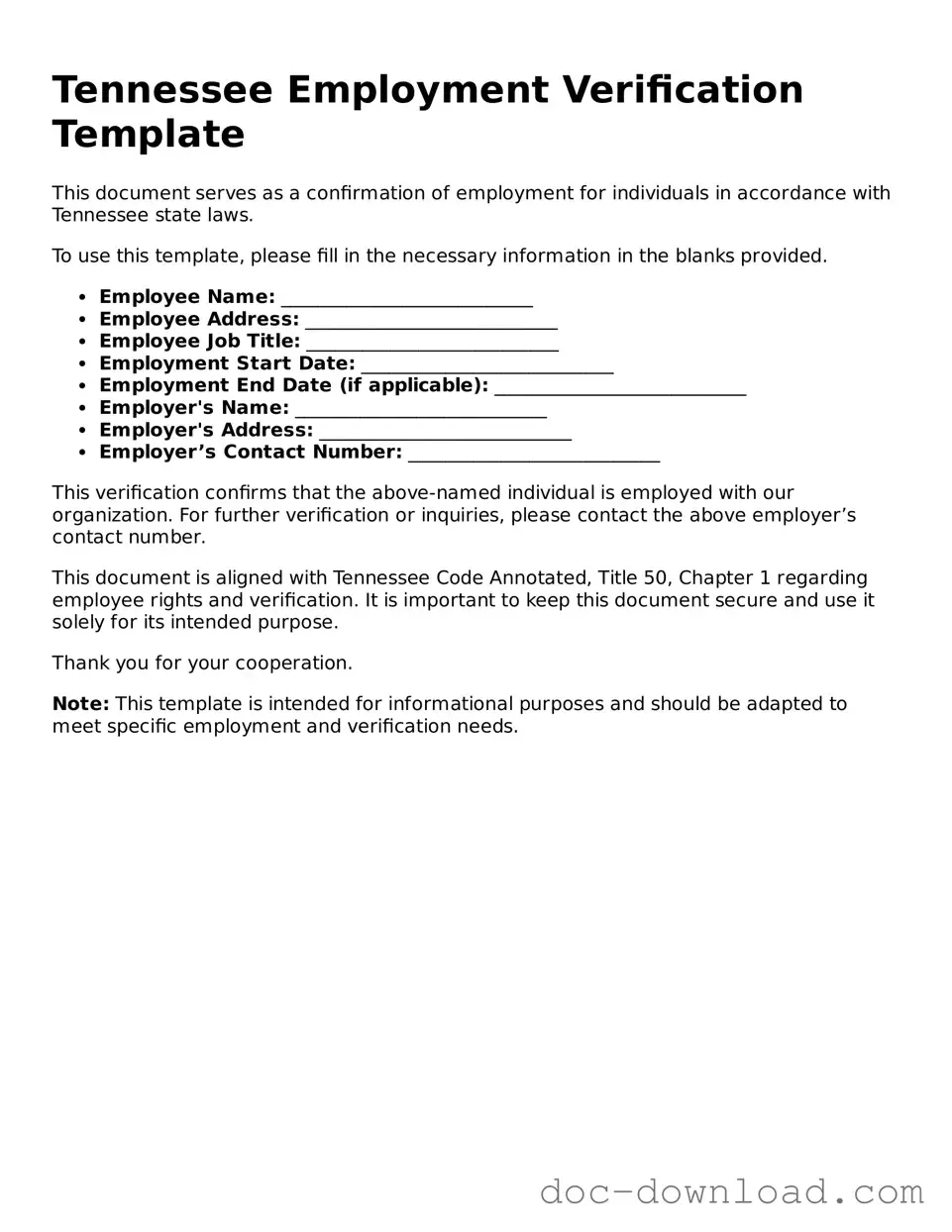Blank Employment Verification Document for Tennessee
In the state of Tennessee, the Employment Verification form plays a crucial role in the hiring process, serving as a tool for employers to confirm the employment history of prospective employees. This form is often requested by employers to validate the information provided by applicants, ensuring accuracy and integrity in the recruitment process. It typically includes essential details such as the applicant's job title, dates of employment, and the nature of their work responsibilities. Additionally, it may require the verification of salary information and the reason for leaving a previous position. By utilizing this form, employers can make informed decisions, while applicants can demonstrate their qualifications and work history. Understanding the importance of this document is vital for both job seekers and employers, as it helps maintain transparency and trust within the employment landscape.
Similar forms
The I-9 form is a crucial document used by employers in the United States to verify an employee's identity and eligibility to work. Like the Tennessee Employment Verification form, the I-9 requires specific information from both the employer and the employee. It collects personal data, including the employee's name, address, and Social Security number, and mandates the presentation of valid identification. Both forms aim to ensure compliance with federal and state employment laws, although the I-9 focuses more on immigration status.
The W-4 form, while primarily a tax document, shares similarities with the Tennessee Employment Verification form in that it collects personal information from employees. The W-4 helps employers determine the correct amount of federal income tax to withhold from an employee’s paycheck. Like the employment verification form, it requires the employee's name, address, and Social Security number. Both forms are essential for ensuring proper payroll processing and compliance with tax regulations.
The 1099 form serves as a report for independent contractors and freelancers, detailing income received during the tax year. Similar to the Tennessee Employment Verification form, it requires the contractor's name, address, and taxpayer identification number. Both documents help establish a clear record of employment and income, which is vital for tax purposes. However, the 1099 is used specifically for non-employee compensation, while the employment verification form focuses on confirming employment status.
The State Unemployment Insurance (UI) Claim form also bears resemblance to the Tennessee Employment Verification form. Both documents require personal information from individuals seeking benefits or employment. The UI Claim form is used to determine eligibility for unemployment benefits, while the employment verification form confirms an individual's employment status. Each form plays a critical role in the administrative processes related to employment and benefits.
The Minnesota Motor Vehicle Bill of Sale form is essential for any vehicle transaction, ensuring that all necessary details are properly recorded to avoid misunderstandings. It's important to keep in mind that this document complements others related to employment verification and financial processes; for further information on this specific bill of sale, read here.
The Employee Handbook is another document that shares some characteristics with the Tennessee Employment Verification form. Although it serves a different purpose, the Employee Handbook outlines company policies, procedures, and expectations for employees. Both documents require employees to provide certain personal information and may include sections that require signatures to acknowledge understanding. Each document serves to clarify the relationship between the employer and employee, ensuring that both parties are aware of their rights and responsibilities.
Document Overview
| Fact Name | Details |
|---|---|
| Purpose | The Tennessee Employment Verification form is used to confirm an individual's employment status and details with a specific employer. |
| Required Information | The form typically requires the employee's name, position, dates of employment, and salary information. |
| Governing Law | This form is governed by Tennessee Code Annotated § 50-1-103, which addresses employment verification processes. |
| Use Cases | Commonly used for loan applications, rental agreements, or background checks, it serves as proof of employment. |
| Submission Process | Employees usually need to submit the form to their employer for completion before it can be provided to third parties. |
| Confidentiality | Employers must handle the information on the form with care, ensuring compliance with privacy laws. |
| Verification Timeline | Employers are generally expected to complete the verification process promptly, often within a few business days. |
Additional State-specific Employment Verification Forms
Texas Employment Comfirmation Letter - Provides proof of employment for various purposes.
Massachusetts Employment Comfirmation Letter - It’s important to keep your employment verification details up to date.
To effectively navigate the complexities of legal proceedings in California, it's important to familiarize yourself with the California Judicial Council form. This standardized form not only enhances the clarity of your submissions but also ensures that all pertinent information is accurately presented. For detailed guidance and to fill out the form online, visit https://californiapdffoms.com/, and take the first step towards a smoother legal process.
Employment Verifications - This form supports individuals applying for scholarships or educational programs.
Work Verification Letter Template - Streamlines the documentation process for immigration applications.
Sample - Tennessee Employment Verification Form
Tennessee Employment Verification Template
This document serves as a confirmation of employment for individuals in accordance with Tennessee state laws.
To use this template, please fill in the necessary information in the blanks provided.
- Employee Name: ___________________________
- Employee Address: ___________________________
- Employee Job Title: ___________________________
- Employment Start Date: ___________________________
- Employment End Date (if applicable): ___________________________
- Employer's Name: ___________________________
- Employer's Address: ___________________________
- Employer’s Contact Number: ___________________________
This verification confirms that the above-named individual is employed with our organization. For further verification or inquiries, please contact the above employer’s contact number.
This document is aligned with Tennessee Code Annotated, Title 50, Chapter 1 regarding employee rights and verification. It is important to keep this document secure and use it solely for its intended purpose.
Thank you for your cooperation.
Note: This template is intended for informational purposes and should be adapted to meet specific employment and verification needs.
